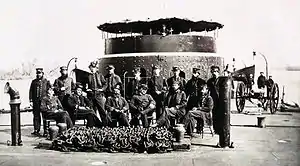USS Patapsco (1862)
USS Patapsco was a Passaic-class ironclad monitor in the United States Navy during the American Civil War. She was named for the Patapsco River in Maryland.
.jpg.webp) Pencil sketch of USS Patapsco | |
| History | |
|---|---|
| Name: | USS Patapsco |
| Builder: | Harlan & Hollingsworth |
| Laid down: | Unknown |
| Launched: | 27 September 1862 |
| Commissioned: | 2 January 1863 |
| Stricken: | 1865 (est.) |
| Fate: | Sunk by mine on 15 January 1865 |
| General characteristics | |
| Class and type: | Passaic-class ironclad monitor |
| Displacement: | 1,875 long tons (1,905 t) |
| Length: | 241 ft (73 m) |
| Beam: | 46 ft (14 m) |
| Draft: | 10 ft 10 in (3.30 m) |
| Installed power: | 320 ihp (240 kW) |
| Propulsion: |
|
| Speed: | 6 kn (6.9 mph; 11 km/h) |
| Complement: | 105 officers and enlisted |
| Armament: | 1 × 15 in (380 mm) smoothbore gun, 1 × 8 in (200 mm) Parrott rifle |
| Armor: | |
| Notes: | Armor is iron. |
Built in Wilmington, Delaware
Patapsco was the fourth U.S. Navy ship to bear that name. She was built by Harlan & Hollingsworth, Wilmington, Delaware; launched on 27 September 1862; and commissioned on 2 January 1863, Commander Daniel Ammen in command.
Civil War service
Assigned to the South Atlantic blockade
Assigned to the South Atlantic Blockading Squadron, she took part in a bombardment of Fort McAllister on 3 March. On 7 April, Patapsco joined eight other ironclads in a vigorous attack on Fort Sumter, and received 47 hits from Confederate gunfire during that day.

Beginning in mid-July, she began her participation in a lengthy bombardment campaign against Charleston's defending fortifications. This led to the capture of Fort Wagner in early September. Fort Sumter was reduced to a pile of rubble, but remained a formidable opponent.
In November 1863, Patapsco tested a large obstruction-clearing explosive device that had been devised by John Ericsson. Remaining off South Carolina and Georgia during much of 1864 and into 1865, the monitor — or her boat crews — took part in a reconnaissance of the Wilmington River, Georgia, in January 1864 and helped capture or destroy enemy sailing vessels in February and November of that year.
Sunk by a mine
On 15 January 1865, while participating in obstruction clearance operations in Charleston Harbor, Patapsco struck a Confederate mine and sank, with 75 lost. The ship's Executive Officer, Lieutenant William T. Sampson was one of a handful of survivors.
References
- This article incorporates text from the public domain Dictionary of American Naval Fighting Ships. The entry can be found here.
- Additional technical data from Gardiner, Robert (1979). Conway's All the World's Fighting Ships 1860–1905. Conway Maritime Press. p. 120. ISBN 0-85177-133-5.